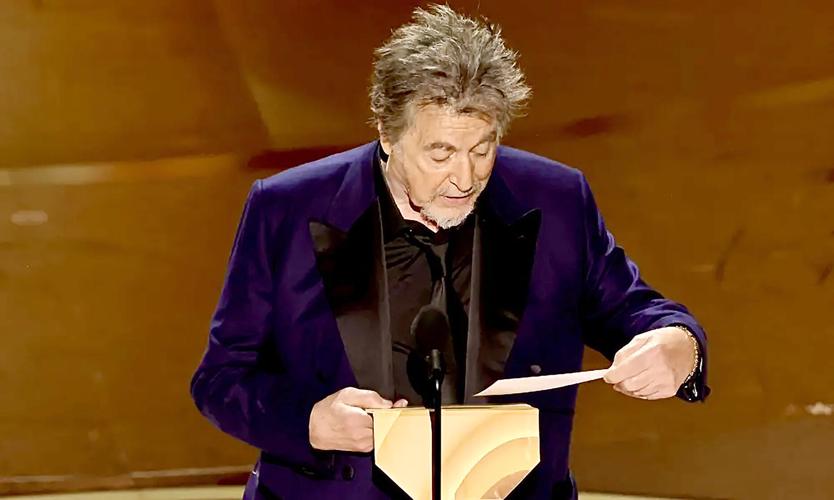The 96th Academy Awards had gone quite well until a little hiccup near the close of the show during the most important award of the evening. In an era in which everyone with a smartphone suddenly becomes a cultural commentator, the reaction to how actor Al Pacino revealed the winner of the best picture category was intense.
Fortunately the comments, at least the ones I saw, weren’t overly hateful, but they were filled with reactions that bordered on bewilderment. Pacino was expected to present the best picture award with actress Michelle Pfeiffer. They star together in the crime thriller “Scarface” (1983) and the romantic comedy “Frankie and Johnny” (1991). Pfeiffer backed out, citing a family emergency.
Therefore, it was Pacino alone on the stage with quite a bit of time remaining in the fast-paced show, one of the best in years. He chatted for a little bit, and then preceded to get to the key moment. Usually the nominees are read – in this case ten movies – and the presenter says: “And the Oscar goes to.” Simple, indeed.
Pacino drove his own bus. His unique way of presenting the best picture award included not reading the names of the nominees. Pacino said: “Ten wonderful films were nominated, but only one will take the award for best picture. And I have to go to the envelope for that. And I will. Here it comes. And my eyes see Oppenheimer. Yes. Yes.”
The Academy Awards folks thought it wasn’t necessary to list the nominees again. As a result of the ensuing social media frenzy, Pacino issued a statement saying that he was only following the instructions of the Oscars’ producing team when he omitted the names of the best picture nominees while announcing the winner of the show’s biggest category.
In the statement, Pacino, an Academy Award best actor winner himself, and a nine-time Oscar nominee, said: “I just want to be clear it was not my intention to omit them, rather a choice by the producers not to have them said again since they were highlighted individually throughout the ceremony. I was honored to be a part of the evening and chose to follow the way they wished for this award to be presented.
“I realize being nominated is a huge milestone in one’s life and to not be fully recognized is offensive and hurtful. I say this as someone who profoundly relates with filmmakers, actors and producers, so I deeply empathize with those who have been slighted by this oversight and it’s why I felt it necessary to make this statement.”
Pacino, a beloved performer and a true legend, didn’t come across to me as befuddled. It was more like being playful. Interestingly, he has written a tell-all memoir titled “Sonny Boy,” which is coming out in October. We can now refer to the book as highly-anticipated.
There’s no question that Pacino is an impressive actor, who has appeared in scores of important movies. In 1993, he won the Oscar for best actor for “Scent Of A Woman.” However, he was also nominated for supporting actor the same year for “Glengarry Glen Ross.” His other Academy Award nominations for actor are for “…And Justice For All,” “Dog Day Afternoon,” The Godfather Part II,” and “Serpico.” His three other supporting nominations are for “The Godfather,” “Dick Tracy,” and “The Irishman.”
Pacino’s additional film honors, among many nominations from many groups, include winning a BAFTA and a Golden Globe. For television he has received a couple of Emmy Awards and two SAG Awards. He’s even won two Broadway Tonys. As if that’s not enough, he has a Directors Guild Award for directing the documentary “Looking For Richard,” which examines William Shakespeare’s value to society. In the entertaining movie, Pacino also reads lines from Shakespeare’s drama, “Richard III,” and talks about the playwright’s relevance to popular culture.
Regarding pop culture, the real social media feeding frenzy on Oscar night occurred after Emma Stone won best actress for “Poor Things” instead of Lily Gladstone for “Killers Of The Flower Moon.” The former is a Frankenstein-style celebration of female empowerment, complete with extensive nudity from Stone. The latter is a powerful examination of the mistreatment of an entire civilization, with Gladstone the soul of the story about just one aspect of the horrendous treatment of the North American continent’s Indigenous people. I thought the Academy voters would select Gladstone, but it was not to be. Her heartbreaking performance should have been honored.
“Barbie,” despite being nominated for eight awards, took home only one. That was for the original song by Billie Eilish and Finneas O’Connell, “What Was I Made For.” This is their second win in the category, and they are both officially the youngest winners of two Oscars in Academy history.
Regarding “Barbie,” a stellar moment during the show was Primary Ken actor Ryan Gosling’s razzle-dazzle performance of “I’m Just Ken.” Gosling, surrounded by dozens of tuxedoed male dancers, as well as the other actors who played Ken, wore a bejeweled pink suit. The colorful musical number was exactly what the Oscars should be about, a clever celebratory tribute to entertainment. Legendary 1930s director and choreographer Busby Berkeley would have been delighted.
“Oppenheimer” had the most wins of the night, taking home seven awards, including best picture, actor (Cillian Murphy), supporting actor (Robert Downey Jr.) and director (Christopher Nolan). “Poor Things” received four awards, including production design and costuming over the more colorful “Barbie.” “American Fiction” earned best adapted screenplay and “Anatomy Of A Fall” won for original screenplay.
As expected, the well-deserved Da’Vine Joy Randolph’s supporting actress win was a nice moment for “The Holdovers.” I continue to believe it’s a perfect movie about the emotional connection people have with each other. “Killers Of The Flower Moon” and “Maestro” left the theater empty-handed.
In selecting who the Academy members would vote for here in my column, my score was 16 out of 23 categories correct. The strong showing by “Poor Things” in the design categories, including Makeup and Hair over the expected “Maestro,” tripped up a lot of people. And Stone’s acting win added to the disruption of many movie fans personal ballots.
The program was enjoyable, and Jimmy Kimmel was a pleasing host. The earlier start time was a superb idea. Ratings were up. The program even ended a few minutes before the producers thought it would. The takeaway is clear. Good movies create a good Oscar show.


















Commented
Sorry, there are no recent results for popular commented articles.